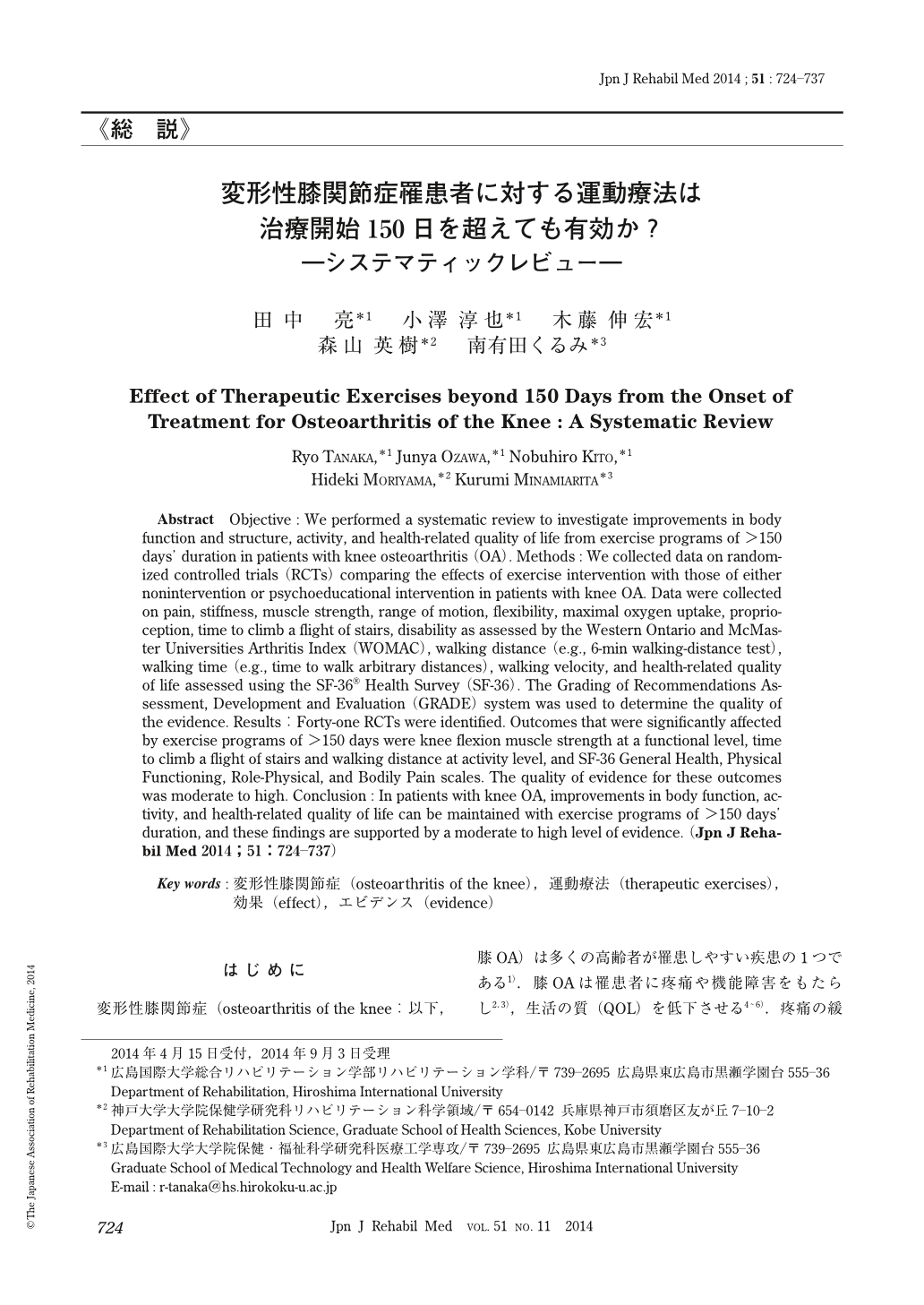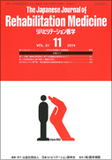Japanese
English
- 販売していません
- Abstract 文献概要
- 1ページ目 Look Inside
- 参考文献 Reference
はじめに
変形性膝関節症(osteoarthritis of the knee:以下,膝OA)は多くの高齢者が罹患しやすい疾患の1つである1).膝OAは罹患者に疼痛や機能障害をもたらし2,3),生活の質(QOL)を低下させる4〜6).疼痛の緩和や機能障害の改善は,膝OAの治療において重要な目標である2,7).
筋力増強運動や有酸素運動などの運動療法は,膝OAの疼痛や機能障害,活動制限を改善させるために行われる保存療法の1つである.過去に行われた無作為化比較試験(Randomized Control trial:以下RCT)では,運動療法による疼痛の軽減,機能障害,および活動制限の改善が検証され,このような効果の一部は,先行のシステマティックレビューにおいても報告されている8〜10).また,運動療法は,膝OAに対する保存療法として,国内と海外のガイドラインにおいて推奨されている11,12).
日本では,医療と介護の役割分担の観点から,医療保険を利用した運動器リハビリテーション(以下,リハ)から,介護保険を利用したリハへのさらなる移行が推進されている.この考え方に基づき,2014年現在,日本の診療報酬制度では,運動器リハに対して治療開始150日までしか点数を算定することができない.そのため,膝OA罹患者は医療保険を適用した運動療法を,原則として150日までしか実施できない.そのうえ,2014年度の診療報酬改定では,要介護被保険者等であって,入院中の患者以外の者は,原則として2016年4月1日以降,治療開始150日を超えた運動器リハの算定対象にならないこととなっている.
これまでに,運動療法を150日以上続けた場合の効果は複数のRCTで検証されてきたが,膝OAに特化したシステマティックレビューによるエビデンスの高さの検討は行われていない.また,医療保険から介護保険に移行させて運動器リハを継続する場合,運動療法の実施の妥当性は介護予防や要介護度悪化予防といった観点から問われてくるが,要介護度と関連深いと歩行能力や基本動作能力は150日を超えた運動療法によって改善されるのか,という疑問は明らかにされていない.そこで,このレビューでは,膝OA罹患者に対する治療開始150日を超えた運動療法の有効性とそのエビデンスレベルを明らかにすることを目的とした.
Abstract Objective : We performed a systematic review to investigate improvements in body function and structure, activity, and health-related quality of life from exercise programs of >150 days' duration in patients with knee osteoarthritis (OA). Methods : We collected data on randomized controlled trials (RCTs) comparing the effects of exercise intervention with those of either nonintervention or psychoeducational intervention in patients with knee OA. Data were collected on pain, stiffness, muscle strength, range of motion, flexibility, maximal oxygen uptake, proprioception, time to climb a flight of stairs, disability as assessed by the Western Ontario and McMaster Universities Arthritis Index (WOMAC), walking distance (e.g., 6-min walking-distance test), walking time (e.g., time to walk arbitrary distances), walking velocity, and health-related quality of life assessed using the SF-36® Health Survey (SF-36). The Grading of Recommendations Assessment, Development and Evaluation (GRADE) system was used to determine the quality of the evidence. Results: Forty-one RCTs were identified. Outcomes that were significantly affected by exercise programs of >150 days were knee flexion muscle strength at a functional level, time to climb a flight of stairs and walking distance at activity level, and SF-36 General Health, Physical Functioning, Role-Physical, and Bodily Pain scales. The quality of evidence for these outcomes was moderate to high. Conclusion : In patients with knee OA, improvements in body function, activity, and health-related quality of life can be maintained with exercise programs of >150 days' duration, and these findings are supported by a moderate to high level of evidence.

Copyright © 2014, The Japanese Association of Rehabilitation Medicine. All rights reserved.


